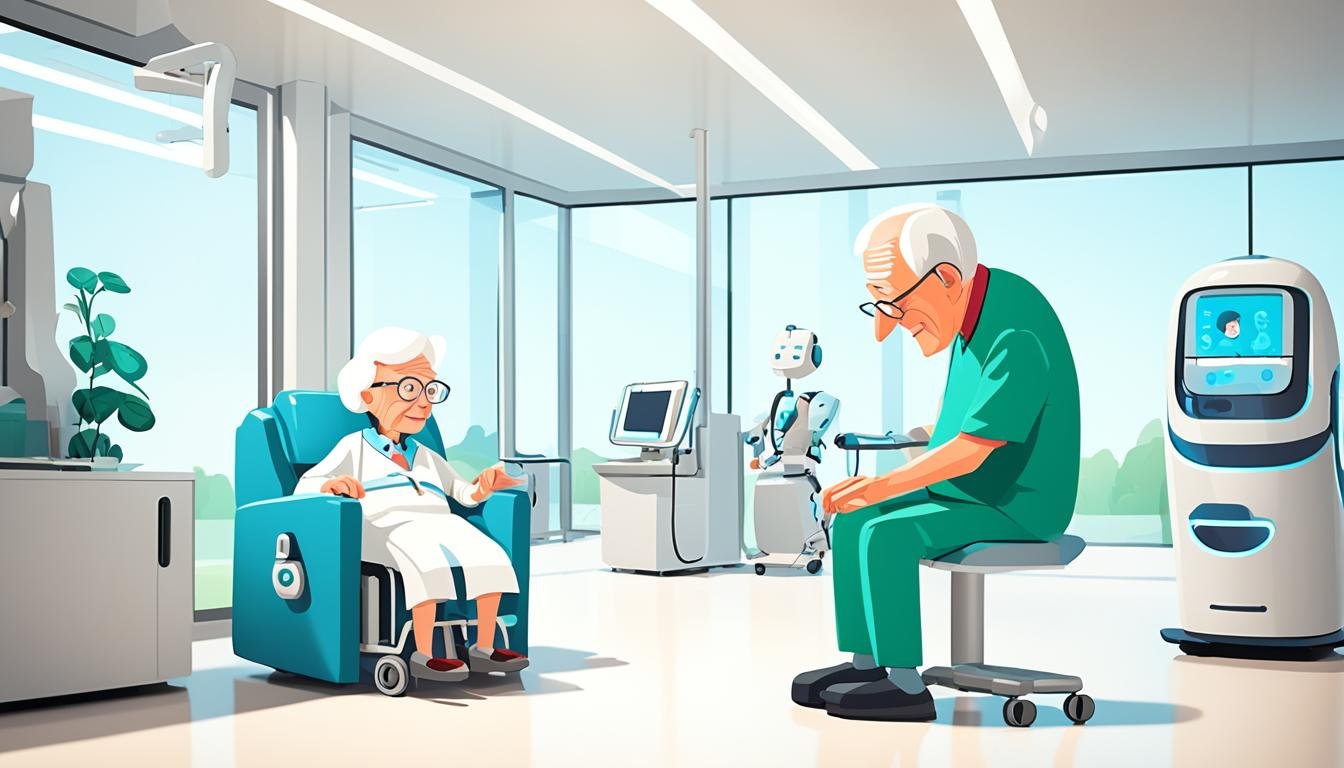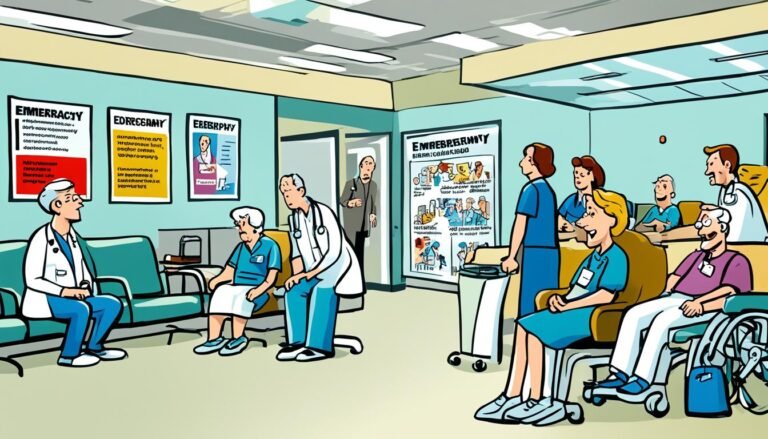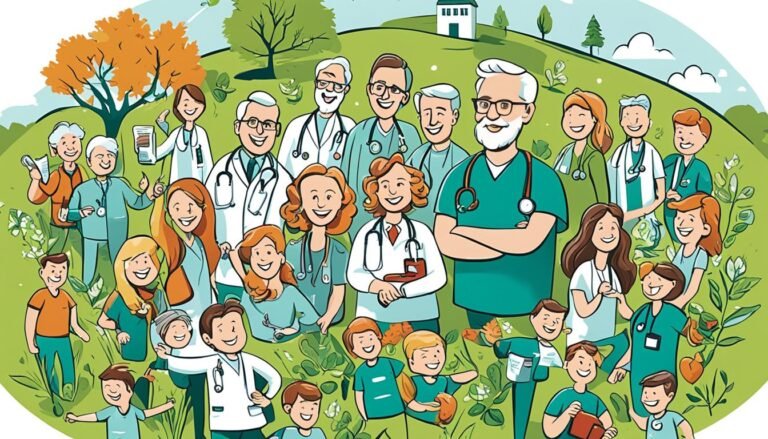Innovations in Geriatric Care in Ireland
Did you know that giving older people a unified care plan can cut hospital visits by 30%? This is what a World Health Organization study found. In Ireland, the National Clinical Programme for Older Persons (NCPOP) is leading this change. It works with the Health Service Executive (HSE) and the Royal College of Physicians of Ireland.
This program is changing how older people get care. It makes sure elderly care technologies and innovations are part of everyday healthcare.
Ireland is facing a big challenge as its population ages fast. The NCPOP is working to improve healthcare for older adults. It aims to help them live independently with dignity.
The program covers everything from doctor visits to home care and hospital stays. It stresses the need for ongoing, connected care. Ireland is now a leader in supporting its aging population with new care innovations.
Key Takeaways
- Integrated care can reduce hospital admissions by up to 30%, as evidenced by WHO studies.
- Ireland’s NCPOP, in partnership with the HSE and the Royal College of Physicians of Ireland, aims to enhance quality care.
- The program facilitates independent living for older adults, ensuring continuous, integrated care across various settings.
- Emphasis on listening to older people’s voices to develop best practice models.
- The initiative underscores Ireland’s commitment to improving elderly care technologies and aging population support.
The Growing Need for Advanced Geriatric Care
Ireland is seeing a big change in its population, with more older people. By 2040, there will be 1.3 billion people over 65 worldwide, up from 506 million in 2008. This means we need better healthcare for older adults.
Demographic Shifts and Aging Population
Europe, including Ireland, is getting older. People are living longer, so there are more elderly folks around. By 2030, more people will face health issues and need help in their old age. This means healthcare needs to change to meet these new needs.
About 4% of older Europeans live in nursing homes now, but this number will go up. In Germany and the UK, the need for care homes will jump by 127% and 111% by 2050. We need to improve our care for older people fast.
The ANCIEN project says we’ll need more beds for nursing and residential care in the Netherlands by 2060. This shows we must act quickly to meet the needs of our aging population.
Chronic Illnesses and Geriatric Syndromes
More older people mean more chronic illnesses and complex health issues. In Ireland, most nursing home residents had four or more health problems and many had dementia. This shows we need better care for older adults.
Healthcare is now focusing on using special tools to help manage care for older patients. These tools help with the issue of giving many medicines to older people. Working together with patients to set care goals is helping improve care. This method is supported by groups like the British Geriatrics Society and Age UK.
National Clinical Programme for Older Persons: An Overview
The National Clinical Programme for Older Persons aims to improve health and social services for seniors. It focuses on quality healthcare, keeping seniors independent, and managing their illnesses well. The program uses a comprehensive approach to make sure older adults get the care they need and move smoothly through the healthcare system.
Objectives and Goals
The program’s main goal is to help older adults stay independent and healthy. Key objectives include:
- Supporting the planning and delivery of health and social services
- Optimizing independence and clinical outcomes for older people
- Improving the management of frail and ill older adults
- Ensuring quick access to appropriate care across all settings
This approach is vital as more older people face chronic illnesses and frailty.
Quality and Access Improvements
The program aims to boost the quality healthcare for seniors. It plans to:
- Reduce delayed discharges by streamlining patient flow
- Decrease the average length of hospital stays
- Develop community health services to prevent unnecessary admissions
- Enhance home care supports and public health nursing
Also, promoting Specialist Geriatric Services has shown to improve patient outcomes and healthcare system efficiency.
Value and Efficiency Gains
Improving value and efficiency is key in the National Clinical Programme. By cutting down on emergency department visits and reducing readmissions, the program aims to make healthcare better. Consolidating services like GP care, home care, and rehabilitation makes healthcare for older adults more effective.
With a 17% increase in seniors by 2016 and another 17% by 2021, this program is more important than ever. Planning ahead and using evidence-based policies is crucial to manage the aging population’s needs and costs.
Impact of The National Clinical Programme on Community Healthcare
The National Clinical Programme (NCP) has greatly improved community healthcare. It brings together different healthcare professionals to care for older adults. Since starting in 2010, the NCP has made healthcare better, more accessible, and more cost-effective.
Support from general practitioners and public health nurses is key in the community. They help keep patients on track with their care, leading to better health and lower costs.
Role of General Practitioners and Public Health Nurses
General practitioners are vital in spotting and managing long-term health issues early. They are the first ones patients see and are crucial for ongoing care. Public health nurses add to this by giving important health services right in the community. They handle things like giving out medicines, caring for wounds, and teaching about health. Together, they make sure older adults get the care they need.
Home Care Supports and Home-Based Care Models
The NCP also works on making home care supports better and creating effective home-based care models. These models let older people get care at home, keeping them independent and respected. They offer important services like personal care, help with daily tasks, and food delivery. This helps older adults stay on their own.
It also leads to care plans that cut down on hospital visits and make life better for older people.
Revolutionizing Acute Hospital Care for Older Adults
In recent years, the way we care for older adults in hospitals has changed a lot. This change is because more older people need healthcare and we want to give them better care.
Specialist Geriatric Services
Hospitals now offer special care for older adults. This care is for the complex health issues that older people often face. By giving them specialized care, hospitals aim to make patients better, work more efficiently, and treat them with respect.
Multidisciplinary Teams
Geriatric care today uses a team approach. Teams include geriatricians, nurses, and others who work together. They make sure patients get all the care they need, from medical help to emotional support.
Acute Hospital and Rehabilitation Care
Combining hospital care with geriatric rehab helps older adults recover faster and live better lives. Rehab programs for older patients improve their skills and help them be more independent. This reduces the chance of staying in the hospital too long or coming back.
For example, the Specialist Geriatric Services Model has made it easier for older people to get day hospital care and special rehab beds. This model focuses on smooth care transitions and delivering top-notch hospital care. It helps older adults get better now and in the future.
Role of Technology in Geriatric Care
Technology plays a key role in caring for the elderly. As more seniors live longer, tech solutions are getting more attention. They aim to make life better for older adults by offering new ways to manage health and get support.
Assistive Technologies
Assistive devices are crucial for helping seniors stay independent and live better lives. Tools like behavior monitors, smart home systems, and telehealth help with everyday tasks. They let seniors stay in their homes safely.
For example, new tech has led to assistive robots. These robots help people who have trouble moving or thinking clearly.
Telemedicine and Remote Monitoring
Telemedicine and remote monitoring have changed how doctors care for the elderly. They let doctors check on patients from afar, cutting down on hospital visits. This is especially good for seniors with ongoing health issues.
New tech can also fight loneliness in older adults, making their lives better. It’s even helping paralyzed people move again. But, issues like privacy, cost, and stigma need to be solved for these techs to be widely accepted.
St. James’s Hospital: A Leader in Geriatric Innovation
St. James’s Hospital is a top place for geriatric innovation in Dublin. It shines with the Centre of Excellence in Ageing. This place is all about improving care for older adults. It uses the latest in dementia research and has a strong healthcare setup.
Centre of Excellence in Ageing
The Mercer’s Institute for Successful Ageing (MISA) at St. James’s Hospital is Ireland’s biggest center for older adult research. It offers a special care service for up to 30,000 people every year. MISA combines top clinical care, research, teaching, and training for older people.
Dementia, Falls, and Frailty Research
St. James’s Hospital leads in dementia research with its big Memory Clinic. It’s the biggest in Ireland and helps people with thinking problems. The Falls and Syncope Unit (FASU) is Europe’s biggest, cutting down on hospital stays with new service models.
The hospital also looks into basic science, clinical studies, and community health. It tackles big issues like falls and frailty in older people.
New State-of-the-Art Hospital and Research Facility
The new hospital and research center at St. James’s Hospital shows off modern healthcare. It mixes diagnosis, treatment, research, and training in one place. This helps patients and healthcare workers a lot.
The Medical Physics and Bioengineering group works on tech research. They offer education at a national and international level. MISA’s Creative Life pillar uses arts to make older people’s lives better.
Specialist Geriatric Services Model of Care
This model of care is changing the way we help older adults. It focuses on using specialist geriatric services to make care better and faster. These services help with quick recovery and make the care process smoother.
Acute Service Provision
Improving acute care is key for older adults. By using detailed geriatric assessments and specialist teams, we can act fast and accurately. This approach cuts down on hospital stays and speeds up recovery.
Studies like the Irish Longitudinal Study of Ageing show that being frail affects how much healthcare people use. That’s why we need these specialized services.
Day Hospitals and Rehabilitation Beds
Day hospitals and geriatric rehabilitation beds are vital in this model. Day hospitals offer various therapies without keeping patients in the hospital. Geriatric rehabilitation beds are for older patients who need a structured recovery plan.
This approach matches what experts from around the world say is best for older, frail people. It shows how important these specialized places are for care.
Enhancing Dementia Care in Ireland
Improving dementia care in Ireland means using new ideas and strong support for those with dementia. The Irish government, healthcare workers, and groups are all working hard on this. Even though Ireland was slow to start a National Dementia Strategy, it can now learn from the best around the world and adapt these ideas for Ireland.
Innovative Dementia Care Initiatives
Ireland has made big steps forward in dementia care with new ideas. The National Dementia Strategy from 2014 focuses on six key areas. These include better awareness, early diagnosis, and more support services.
- Person-centered care approach: Treats people with dementia as full citizens.
- Enhanced service coordination: Combines services for better support for patients and their families.
- Research initiatives: Supports new research to improve dementia care.
Support Systems for Dementia Patients
Support for dementia patients is key to good care and a better life for them. The Irish government is working on building strong support systems for patients and their families.
- Community-based health services: Makes health and social care easier to get in the community.
- Acute hospital settings: Creates special care models for hospitals to fix care issues.
- Long-stay residential care: Makes long-term care facilities better for dignity and quality care.
With these efforts, Ireland aims to give dementia patients the support and care they need. This will improve the lives of both patients and their caregivers.
Training and Support for Caregivers
Investing in caregiver training and support is key. Family caregivers are the biggest helpers for older adults. With good training and resources, they can meet the many needs of seniors, including geriatric mental health services.
Caregiver Training Programs
Good caregiver programs have a few things in common. They check the risks and needs of caregivers and offer specific help. They also make caregivers part of the training process. These programs help both caregivers and the people they care for.
But, many great programs don’t get used much, even though they work well.
The Health Service Executive (HSE) in Ireland offers health services through six Hospital Groups and nine Community Healthcare Organizations. The Home Support Service helps older people stay at home longer. It also supports the people who care for them.
Resources and Community Support
Having resources for caregivers and strong community support systems is key for caregiving. The HSE and laws like the Assisted Decision Making (Capacity) Act of 2015 help caregivers get the support they need. Local groups and networks are important too. They help reduce social isolation and stress in caregivers.
Places like Japan and Germany show new ways to support caregivers. Using these ideas can make life better for both caregivers and those they care for. Technology helps by offering online support and information, making it easier to get help.
The Future of Geriatric Care: Projections and Planning
Looking at geriatric care shows big changes ahead, especially with more older people. We need smart planning and new healthcare policies to handle these changes.
Economic and Social Implications
About 60% of older people in the community are frail, and half of them face serious health issues after leaving the hospital. This shows we must meet the needs of our aging population. Sending frail older people to hospitals can actually help them live longer, saving lives and money.
By 2030, all baby boomers in the U.S. will be over 65, making healthcare costs go up. The number of people over 85 will triple by 2050, from 6.5 million to 17.3 million.
This growth means more people with chronic conditions, affecting 88% of older adults in the U.S. Treating these conditions costs a lot, with an average of $21,342 per person each year.
Policy Developments and Innovations
We need new healthcare policies to tackle these challenges. Using the Comprehensive Geriatric Assessment in hospitals helped 70% of patients. The Hospital Elder Life Program cut hospital stays by 45%, showing it works well.
Working with patients and families has brought big benefits, helping 70% of them. Improving care for chronic kidney disease in primary care also had a 45% success rate.
Addressing elder abuse has made care better by 50%. Looking forward, we must create communities that support older adults with smart policies. This will help manage the growing number of older people and ensure fair healthcare for all.
The Irish Longitudinal Study of Ageing (TILDA)
The Irish Longitudinal Study of Ageing (TILDA) is a key project focused on aging in Ireland. It collects detailed data on health, social, and economic aspects of older people over time. This gives us deep insights into aging.
Insights and Findings
Initially, 291 people did a computer-assisted personal interview (CAPI), and 176 had a health check. These findings showed us a lot. For example, people with lower social status, who were less active, or smokers were more likely to miss the health check.
Those who had their health check at home were found to be more disabled, had weaker grip strength, and walked slower than those who went to a center. The study looked at 216 households and got a 45% response rate.
It used a special analysis to look at the differences between how people were assessed. The data was managed with SAS software version 9.1. This gave us important insights into aging.
Impact on Geriatric Care Policies
Since starting in 2006, TILDA has worked to shape geriatric policies in Ireland and around the world. It releases data every two years to help improve care for the elderly. The study uses different methods to analyze the data deeply.
It also looks at existing research and grey literature to support its findings. Getting approval from the Trinity College Research Ethics Committee and getting participants to agree to take part shows the study’s focus on ethics. TILDA’s work is key to improving care for older people in Ireland and elsewhere.
Conclusion
Ireland has made big strides in caring for the elderly. This is shown in a detailed review of many areas like special services, using technology, and new policies. They looked at 4,222 items and picked 148 for a closer look, showing their thoroughness in finding the best info for older adults.
This search covered health care, nursing, medicine, and social care. They used strict rules to pick only the best and most relevant info. This shows Ireland’s strong focus on quality care for the elderly.
Ireland is leading the way in planning for the future of health care. They’ve found that many older people suffer from pain, depression, and falls. This shows where they need to improve.
They looked at both official and unofficial research and analyzed it deeply. This gave them a full picture of how care is given and the challenges faced in different places.
In the end, Ireland is committed to giving the best care to older people. They aim for universal access to palliative care, even with funding issues and differences across regions. Looking ahead, they plan to keep improving and using new ideas in care.
This summary shows Ireland’s big effort to make life better for older adults in health care. It’s a complete plan for better care in the future.
Source Links
- Health care for older adults in Europe: how has it evolved and what are the challenges?
- A practical guide to the local implementation of Integrated Care Programmes for Older Persons
- Including older people in clinical trials to develop innovative healthcare solutions
- The Relevance and Added Value of Geriatric Medicine (GM): Introducing GM to Non-Geriatricians
- COVID-19 highlights the need for universal adoption of standards of medical care for physicians in nursing homes in Europe – European Geriatric Medicine
- Microsoft Word – Home Health Care edited clean 26.1.16
- Older People – HSE.ie
- National clinical programmes in the Republic of Ireland: a qualitative study of acute hospitals
- Implementing Integrated Care in Practice – Learning from MDTs Driving the Integrated Care Programme for Older Persons in Ireland
- Administration on Aging | ACL Administration for Community Living
- Insights Into the Older Adults’ World: Concepts of Aging, Care, and Using Assistive Technology in Late Adulthood
- 24 new innovations to improve the lives of older adults
- Technology in geriatrics
- Geriatric Care Management System Powered by the IoT and Computer Vision Techniques
- Kenny Rose Anne | St James’s Hospital
- Technology Research for Independent Living Centre Launches Falls Risk Assessment Technologies
- Solution description
- Managing frailty in an Irish primary care setting: A qualitative study of perspectives of healthcare professionals and frail older patients
- Innovative methods for involving people with dementia and carers in the policymaking process
- Support and Services for Caring for Older People – HSE.ie
- Programs and Supports for Family Caregivers of Older Adults – Families Caring for an Aging America
- Senior Care Around the World: Innovation and Bright Ideas from Countries Across the Globe | Arosa
- The systematic approach to improving care for Frail Older Patients (SAFE) study: A protocol for co-designing a frail older person’s pathway
- Healthcare on the brink: navigating the challenges of an aging society in the United States – npj Aging
- Comparison of centre and home-based health assessments: early experience from the Irish Longitudinal Study on Ageing (TILDA)
- Independent programme of evaluation of the State’s investment in The Irish LongituDinal Study on Ageing (TILDA) – Main report
- A literature review to explore integrated care for older people
- End-of-life experience for older adults in Ireland: results from the Irish longitudinal study on ageing (TILDA) – BMC Health Services Research








